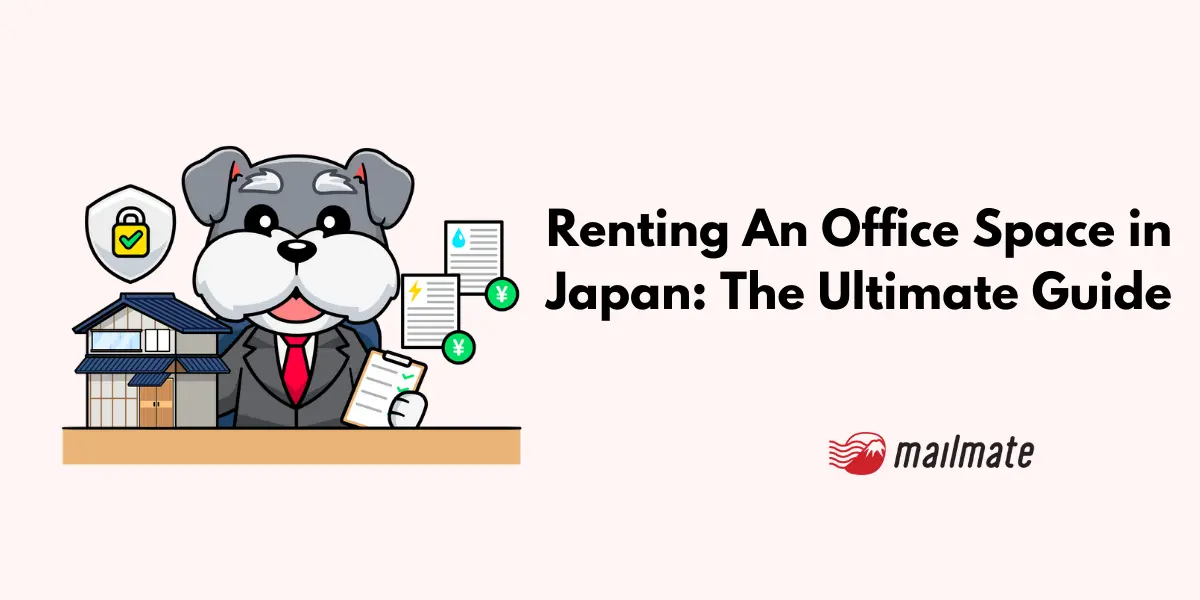Renting An Office Space in Japan: The Ultimate Guide

Renting an office price in a prime location provides a professional image with a reputable business address and location. However, it involves higher initial and ongoing costs, including rent, utilities, setup expenses, and maintenance.
Additionally, traditional office spaces have longer lease terms and limited flexibility to relocate, downsize, or upgrade.
This guide will help you understand how to rent office space in Japan, whether for the long or short term, and the alternatives for your business needs.
How much does it cost to rent an office in Japan?
Renting an office in Japan will vary throughout Japan.
For example, physical office spaces in Central Tokyo can cost 1.23 million Japanese yen per square meter, compared to Fukuoka, where the monthly rent is 225,570 yen per square meter. Additionally, a new office space will be more expensive.
Note: If you see tsubo, or 坪, is the traditional measurement unit, about 3.3 square meters or 35.6 square feet.
Fees when renting an office space in Japan
Those leasing in Japan are required to pay sales tax, which is 8% of the rent, along with these additional fees:
Security deposit (敷金, shikikin): about 2-6 months’ rent.
Key money (礼金, reikin): non-refundable fee, about 1-2 months’ rent.
Agency Fee (仲介手数料, chukai tesuryo): a commission real estate agent fee, about one month’s rent.
Management fee (管理費, kanri-hi): a monthly fee for building maintenance and common area upkeep.
Insurance (保険, hoken): fire and liability insurance.
Renewal fee (更新料, koshinryo): you are to renew the lease again after the initial term.
Utilities (光熱費, konetsuhi): the costs for electricity, water, gas, and sometimes internet and phone services.
Furniture and equipment: invest in furniture and office equipment.
Fixed amortization fee (if applicable): scheduled payment towards a loan or debt repayment.
Additionally, a free rent term exists with a free rent period, and the tenant does not need to pay rent, which is great for businesses that want to establish themselves without the initial financial burden.
How to rent an office space to rent in Japan
Renting an office space in Japan is not that complex, but knowing the steps and what to look for can help you find a permanent business space.
1. Choose the right location.

Location is the most important factor when looking to set up your business.
Depending on your business, you’ll consider factors such as:
Proximity train stations and airports
Walking distance to the nearest station
Commuting time and fees
Proximity to banks and post office
Nearby restaurant options
Additionally, different areas are known for their district characteristics. For example, Tokyo’s central business district is in the city’s central wards, such as Marunouchi, Minato, Ōtemachi, and Shibuya.
2. Arrange a viewing.

Once you have two or three locations, arrange a viewing for them. Seeing them in person lets you know how much space you have for your employees and add any needed office amenities.
Additionally, it’s the perfect way to check for the building facilities, the ease of commuting there, and surrounding amenities.
Many real estate agents will help you negotiate and arrange viewings if you are not in Japan.
3. Understand office lease types.

There are two types of office leases for your business to sign when renting an office space in Japan.
Office Type |
Initial Costs |
Monthly Costs |
Flexibility |
Suitable For |
Long-Term Lease |
High (Security deposit, key money, agency fees) |
High (Rent, utilities, maintenance) |
Low |
Established businesses, large corporations |
Short-Term Lease |
Moderate (Some initial fees may apply) |
Moderate to High (Rent, utilities, maintenance) |
Moderate |
Startups, project-based teams, temporary offices |
1. Long-term rent when renting an office
Long-term rent is broken into two types of real estate leases:
a. Ordinary renewable leases
Under Japan's Land and Building Lease Law, a lease lasts 1-2 years, similar to an apartment lease.
It is the most consistent and great for businesses staying in one location for the long term.
b. Fixed-term leases
Fixed-term leases are contracts with a clear and predetermined duration for the tenant and no automatic renewal.
This type of lease offers flexibility and benefits landlords and tenants who want to renegotiate after the lease ends.
2. Short-term rent when renting an office
Short-term leases are usually for “serviced offices” in Japan, which are equipped, ready-to-use office spaces that can be rented flexibly.
Those who use a serviced office will have IT infrastructure, a utility room, and a meeting/conference room.
The fees include security, utilities, office furniture, and the office space rent.
4. Pass the tenant screening.
Foreigners might have a harder time renting office space in Japan. The leaser usually declines the application because:
The foreign business is establishing and renting an office in Japan for the first time
There isn't enough business history in Japan
The business representatives are of foreign nationalities
The business does not have a cosigner for a lease contract
To put yourself on the best footing, prepare these documents:
A business plan with your financial management
Business’s financial statements up to three years
Your business partner or customer information about the business in Japan
Qualification summaries and work history of your representative
Financial support letter to confirm guaranteed rent payment when renting an office
Alternative to renting an office space in Japan
There are 3 types of different spaces you can consider besides a traditional office space.
Office Type |
Initial Costs |
Monthly Costs |
Flexibility |
Suitable For |
Virtual Office |
Low (Usually just a setup fee) |
Low (Monthly fee for address, mail handling) |
High |
Startups, remote teams, international businesses |
Shared Office |
Low to Moderate (Membership or initial deposit) |
Moderate (Membership or rent, utilities included) |
High |
Freelancers, small businesses, remote workers |
Home Office |
Low (Minimal setup costs) |
Low (Home utility costs) |
Very High |
Freelancers, remote workers, small online businesses |
1. Virtual office
Virtual offices are the best alternative to renting an office in Japan.
They offer a professional business address without applying a physical space. Instead, you use a virtual office space provider’s address, lowering the overhead costs.
When using or switching to a virtual office in Japan, your mail will be redirected to the provider’s address, meaning they will handle it. Different virtual address providers have different procedures for forwarding your mail.
Use MailMate’s virtual office as your go-to.
MailMate’s virtual office plan is perfect for startups and entrepreneurs entering the Japanese market.

Here’s how MailMate is the best option for you.
a) Have a physical Japanese address
Get an address in Japan without physically renting an office space! That’s what a virtual office address is.

You can choose between addresses in Tokyo’s business districts such as Shinjuku and Minato-ku or Fukuoka City’s business area in Hakata and Tenjin for a reduced price with a virtual address from MailMate.
b) Eliminating physical office costs
With a virtual office, your business does not need to pay ongoing overhead costs for rent, maintenance, and utilities. Instead, all you pay for is the address provided.
Plus, using a virtual office has a lower initial investment cost, meaning you will avoid paying high down payments on a fixed lease.
With MailMate’s virtual address, you only pay month by month—no fixed contract and you can cancel at any time.
c) Flexible work environment
Virtual office space is great for those with online businesses, remote workers, freelancers, or who want to start with hybrid work.
There are plenty of virtual office tools and virtual office softwares to help you stay focused on your tasks.
If you need a physical office space for a day, there are plenty of one-day or hourly office spaces around the city.
d) Mail and document management

When using or switching to a virtual office in Japan, your mail will be redirected to the provider’s address, meaning they will handle it.
Using a virtual office for your business needs means that all incoming mail related to your business comes to MailMate.
MailMate will scan the outside contents for you to view on your dashboard. Then, you can request to open the mail, and MailMate will scan its content. You also have additional options, such as forwarding and shredding that mail.
Their bilingual staff is here to help you understand and manage your Japanese mail.
Plus, all important documents will comply with Japan’s new electronic bookkeeping system.
2. Shared office
Also known as coworking spaces, these are communal workspaces where individuals and different companies work in the same space. These locations also allow remote and hybrid workers to come in and use their space for a certain amount of time.
Shared offices are a good option for networking. Their flexible teams and cost efficiency make them more advantageous than traditional or private offices.
However, because the office is open and communal, there is a lack of privacy and constant noise around you.
3. Home office
Home offices are ideal as they combine where you live and work.
While great for remote and online work, using your home address for your business puts your privacy at risk and can present your business as unprofessional.
In closing
Renting an office space in Japan can be time-consuming, but establishing your business here is well worth it.
If renting office spaces are a bit out of the price range, then consider alternatives such as virtual addresses or coworking spaces to cut time and cost.
Spending too long figuring out your Japanese mail?
Virtual mail + translation services start at 3800 per month. 30-day money-back guarantee.

